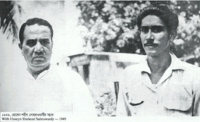Bengalis in Pakistan
     Notable Pakistanis of Bengali and Bangladeshi origin: Zaib-un-Nissa Hamidullah · Mahbub Jamal Zahedi • Khawaja Nazimuddin • Iskander Mirza • Huseyn Suhrawardy | |
| Total population | |
|---|---|
|
Est. 200,000 immigrants of Bengali origin 100,000 registered Bengali immigrants[1] Est. 100,000 – 500,000 illegal migrants from Bangladesh | |
| Regions with significant populations | |
| Karachi | |
| Languages | |
| Bengali · Urdu · English (Pakistani English) · Bangladeshi languages | |
| Religion | |
| Islam |
Pakistani Bengalis (Urdu: پاکستانی بنگالی ) are those Pakistani citizens, who migrated from Bengal region following the independence of Pakistan and the Fall of Dhaka. They are mainly settled in Karachi, Sindh, Pakistan. Different sources estimate the population of Pakistani Bengalis between 1,000,000-3,000,000 immigrants in Karachi with Bengali origin.[2][3]
Migration from East Pakistan
Many of the people are migrants from East Pakistan, settled in the present day West Pakistan, and remained loyal to Pakistan, even after the Bangladesh Liberation War, while others immigrated from Bangladesh later. Much of the Bangladeshi-origin population also includes the thousands of stateless Biharis (called Stranded Pakistanis) who were allowed resettlement in Pakistan after the 1971 war in Bangladesh. Surur Hoda was actively involved in issues relating to Bihari refugees in Bangladesh.Surur Hoda organized a delegation, headed by Ennals and Ben Whitaker, which contributed to nearly 200,000 refugees returning to Pakistan.[4]
Suppression under Bhutto's Rule
By 1995 however, continuous migration led it to cross the 2,500,000 mark. During the administration of Prime Minister Benazir Bhutto, some top advisers became concerned with the large Bangladeshi migrant population, afraid they could become second largest group in Karachi after Urdu-speaking Muhajir people and disturb sensitive demographics. Accordingly, Bhutto ordered a crackdown and deportation on Bangladeshi immigrants. Her action strained and created tensions in Bangladesh–Pakistan relations, with Khaleda Zia, who was in power in Dhaka during the time, refusing to accept the deportees and reportedly sending two planeloads back towards Pakistan and Muslim political parties in Pakistan also criticized Bhutto and dubbing the crackdown as anti-Islamic. She was ultimately forced to abandon the order.[5]
Bengali colonies
There are numerous Bengali colonies in Karachi, often called "Mini Bangladesh",[6] such as Machar Colony, Musa Colony and Chittagong Colony. The Bengali communities in Pakistan are also adopting Urdu and are assimilating with Muhajirs. When one walks through these colonies, one can see the colorful Bengali signboards, Bhashani caps, lungis and kurtas.[7] The Chittagong Colony has a bazaar, which was famous throughout Pakistan as the center for Dhaka cloth.[8]
Culture and education
University of Karachi offers Bachelor's and Masters courses in Bengali.[9]
Karachi was also the headquarters of the local Bengali language newspaper Daily Qaumi Bandhan.[7]
Notable people
- Munni Begum
- M. Shahid Alam
- Muhammad Mahmood Alam – Pakistani Fighter ace.
- Habibullah Bahar Chowdhury
- Raja Tridev Roy
- Zaib-un-Nissa Hamidullah
- Alamgir (pop singer)
- Jalaludin Abdur Rahim
- Roopa Farooki – British writer (half Pakistani, half Bangladeshi)
- Ikram Sehgal
See also
- List of Pakistani Bengali films
- Musa Colony
- Daily Qaumi Bandhan
- Machiara Colony
References
- ↑ By Abbas Naqvi (17 December 2006). "Falling back". Daily Times. Retrieved 19 January 2010.
- ↑ Five million illegal immigrants residing in Pakistan
- ↑ Owais Tohid; Arshad Mahmud (29 Nov 1995). "Homeless In Karachi". Outlookindia.com. Retrieved 18 Dec 2011. "Officials say there are more than 2,500,000 Bengali Pakistanis, 650,000 Afghans, 200,000 Burmese, 2,320 Iranians and Filipinos and hundreds of Nepalese, Sri Lankans and Indians living in Karachi. The officials believe they may create tension in Karachi, a city already stricken by political and ethnic violence that has claimed more than 1,650 lives this year. Many of these immigrants have fake Pakistani passports and identity cards."
- ↑ McRobie, George (30 June 2003). "Surur Hoda". The Guardian (London). Retrieved 2011-07-08.
- ↑ INDO-BANGLADESH STANDOFF
- ↑
- ↑ 7.0 7.1 "Homeless In Karachi". Outlook. Retrieved 2010-03-02.
- ↑ "Falling back". Daily Times. Retrieved 2010-03-02.
- ↑ "Official Website of Department of Bengali". University of Karachi. Retrieved 2014-01-22.
External links
- Bangladeshi migrants struggle in Karachi slum (video)
- Homeless in Karachi
- You Can't Get There From Here: Bengali immigrants in Pakistan now wish they'd never left Bangladesh
- Bengali immigrants in Karachi polarised over violence in Bangladesh
- Bengalis afraid of losing their identity and rights
| ||||||||||||||||||||||
| |||||||||||||